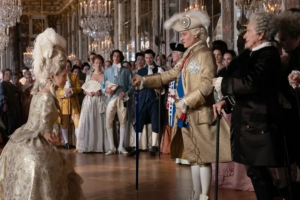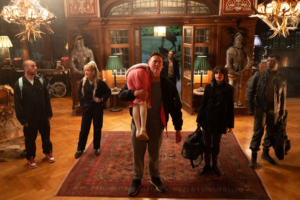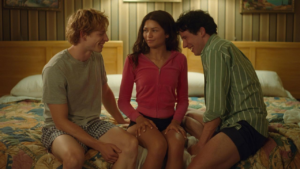Reviewed by GREG KING
Director: Hou Hsaio-Hsien
Stars: Shu Qi, Chang Chen, Yun Zhou, Nikki Hsin-Ying Hsieh.

The superb wire work and spectacular martial arts work in Ang Lee’s Oscar winning Crouching Tiger, Hidden Dragon produced a massive cross over hit. Unfortunately it is unlikely that the latest Chinese art house martial arts film The Assassin will have quite the same appeal. Winner of several prestigious awards in various film festivals, including the Best Director award in Cannes, The Assassin arrives on our screens with plenty of pedigree. This is the first film in eight years from Taiwanese director Hou Hsaio-Hsien (Flight Of The Red Balloon, etc), and is something of a slow burning sensory feast that will appeal to lovers of art house cinema.
A brief prologue filmed in black and white and the boxy 4:3 ratio introduces us to 9th century China during the reign of the powerful Tang dynasty, when the provinces were trying to gain independence from the Imperial Court. An understanding of Chinese history would be helpful in understanding much of what transpires here.
The film follows Nie Yinniang (Shu Qi, from the first Transporter film, etc), who from an early age has been trained as a merciless assassin. But when she demonstrates an inability to kill someone in the presence of a child she is sent to murder the lord Tian Ji’an (Chang Chen), the governor of Weibo province and who just happens to be her cousin. At one stage she was betrothed to him, and she is conflicted about her mission. But she does not kill him, and this causes further friction in the already divided court. Tian is at odds with his wife (Yun Zhou) over his relationship with the beautiful concubine (Nikki Hsin-Ying Hsieh).
It took Hsaio-Hsien eight years to bring his vision for this wuxia epic to the screen. The film is visually stunning to look at thanks to the lush cinematography of regular collaborator Mark Lee Ping, who uses long takes and the widescreen effectively to capture some beautiful imagery. Those expecting some frenetic martial arts action may be disappointed as the action sequences here are graceful and meticulously staged but relatively brief. Hsaio-Hsien and Ping too often cut away from clashing sword duels to give us glimpses of the mountains and verdant forests, a cinematic device that becomes frustrating.
The Assassin doesn’t exactly follow a conventional narrative structure and the elusive story needed fleshing out more. Dialogue is sparse, as is the characterisation. We don’t really get much of a feel for the characters, which makes it hard for audiences to empathise with them or form an emotional connection with their fate. Qi brings a brooding quality to her performance as the reluctant warrior, but she also handles the physical stuff convincingly. Qi and Chen previously worked for the director in Three Times and they have a well established rapport.
However, the film is visually stunning with some superb production design from Huang Wen-Ying, which brings to life the ornate palaces of the era. The gorgeous costumes – the elaborate headdresses, silk robes etc – also give us a glimpse into the rich life at court in this era. The film also explores themes of identity, class, desire, regret, duty, politics, and the ramifications of violence. But The Assassin is rather dull and plodding, as Hsioa-Hsien puts the visuals and the politics of 9th century China ahead of the action.
More Terrence Malick than traditional martial arts action movie, The Assassin is a far cry from the martial arts films of Bruce Lee and Jackie Chan, et al. The pacing is glacial, which will further frustrate many expecting more in the way of kick arse action.
★★☆



